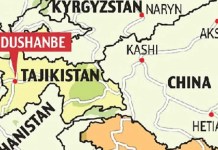Amid rising Taliban violence and stalled peace negotiations between the Afghan government and the hardline Islamic outfit, Pakistan PM visited Kabul, and said he “will do everything to restore peace in the war-torn country”.
After Germany, Switzerland On-Course To Acquire Stealth F-35 Jets As US Makes Official Proposal
Khan — this was his first visit to Kabul since he assumed the PM office — was received by Afghan Foreign Minister Mohammad Haneef Atmar and Afghan President’s Special Representative for Pakistan Mohammad Umer Daudzai. He met President Ashraf Ghani, and the two leaders explored ways to deepen the bilateral ties and discussed the Afghan reconciliation process.
While the relations between Islamabad and Kabul have not always remained friendly, Imran Khan’s visit has been painted as a message for the Taliban to end violence in the country.
“The idea of visiting at a time when violence is increasing [in Afghanistan] is to assure you, President Ghani, that the people and the government of Pakistan have only one concern; peace in Afghanistan,” Khan said during the visit. Ghani said the common objective for the two countries was to “overcome the distrust that has haunted our relationship”.
My visit to Kabul was another step towards conveying Pakistan's commitment to peace in Afghanistan. I have never believed in military solutions which is why I always believed that in Afghanistan peace will be achieved through political dialogue.
— Imran Khan (@ImranKhanPTI) November 20, 2020
Afghanistan has been strategically important to both India and Pakistan. New Delhi’s close ties with Kabul have always irked Islamabad. With Imran Khan’s efforts and Pakistan’s role in the peace process, the question is: will India lose its ground to Pakistan?
Experts in New Delhi have said that India and Afghanistan share long diplomatic ties, and Pakistan’s cozying up to Afghanistan may look like a concern but India has been sure about its position.

India’s External Affairs Minister S Jaishankar had joined the intra-Afghan peace talks in Doha virtually in September. He had recalled New Delhi’s development partnership with Afghanistan and stated that no part of Afghanistan is untouched by the 400-plus projects. “The friendship of our people is a testimony to our history with Afghanistan,” he had said.
Addressed the conference on Afghan peace negotiations at Doha today. Conveyed that the peace process must:
• Be Afghan-led, Afghan-owned and Afghan-controlled
• Respect national sovereignty and territorial integrity of Afghanistan
• Promote human rights and democracy pic.twitter.com/wFG3E2OVlJ
— Dr. S. Jaishankar (@DrSJaishankar) September 12, 2020
Meanwhile, Pakistan has been accused of giving asylum to terrorists hiding from Afghan forces and sending fighters to support the Taliban.
A report by the United Nations Security Council (UNSC) has said that around 6,500 Pakistani terrorists are operating in Afghanistan, most of them belonging to the Tehrik-e-Taliban Pakistan (TTP). Such reports put Khan’s claims and the future of the relationship between the two countries to question.
On Friday, India made a veiled attack on Pakistan at the UN Security Council meeting. India’s Permanent Representative to the United Nations (UN), Ambassador T. S. Tirumurti said, “For durable peace in Afghanistan, we have to put an end to terrorist safe havens and sanctuaries operating across the Durand Line.”
In his remarks at the Arria Format Meeting at UNSC, Tirumurti pointed out the report of the Analytical Support and Sanctions Monitoring Team under the Al-Qaeda/Da’esh Sanctions Committee which has also highlighted the presence of foreign fighters in Afghanistan.
A BBC report quoting Pakistan Foreign Policy: Escaping India, written by Aparna Pandey, director of the Initiative on the Future of India and South Asia at Hudson Institute, says that Pakistan views Afghanistan and India’s friendship as a threat to its existence.
Pandey has observed that Pakistan wants a government in Afghanistan that is pro-Pakistan and anti-India but has failed to convince Afghan leadership to opt for such measures. Establishing bilateral ties between the two has been difficult because of Afghanistan’s support to Pashtuns and Balochs.
“At the heart of Islamabad’s calculus is a long-standing fear that India, in league with Kabul, is using Afghanistan as a springboard to weaken Pakistan’s territorial integrity, particularly by stoking unrest among its ethnic Baloch and Pashtun populations,” writes Zachary Constantino in a special report for United States Institute of Peace.
The report highlights that New Delhi has committed $3 billion in economic assistance since the fall of the Afghan Taliban in 2001, supporting infrastructure and human resource development across multiple sectors such as Afghan-India Friendship Dam (formerly known as the Salma Dam), Kabul’s national parliament building, and developed trade corridors that bypass Pakistan.




